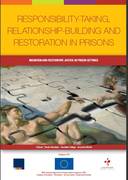 MEREPS – Mediation and Restorative Justice in Prison Settings – was a three-year project funded by the EU. Their final publication (edited by Barabás, T., Fellegi, B. & Windt, Sz.) is now freely downloadable here.
MEREPS – Mediation and Restorative Justice in Prison Settings – was a three-year project funded by the EU. Their final publication (edited by Barabás, T., Fellegi, B. & Windt, Sz.) is now freely downloadable here.
The pilot project tested the applicability of the restorative justice (RJ) approach in the Hungarian prison system. It focused on two key practical questions:
- How can practices representing restorative principles be introduced in prison settings?
- What are the institutional, legal and personal conditions that serve as supportive circumstances, and what are the specific challenging circumstances?
Based on in-depth interviews and participant observations, the study shows a thorough picture of the internal dynamics and mechanisms of a prison, including attitudes of staff and ways in which RJ can be integrated into this world.
I found this interesting comment on page 13 of the final report: "The pilot study shows how restorative justice can positively influence the communication culture of a hierarchical institution [the prison], how it can become a first step towards empowering people (both staff and inmates) to articulate their needs, and to believe that some dialogue and cooperation might be possible."
The report also includes a case study by Vidia Negrea of Community Service Foundation of Hungary, IIRP's international affiliate. Other report authors include Theo Gavrielides of the UK and other practitioners and academics from Hungary, Belgium and Germany.
Click here for a free download of the full text of the MEREPS Project's Final Publication in PDF format.

